| Reviews & Columns |
|
Reviews DVD TV on DVD Blu-ray 4K UHD International DVDs In Theaters Reviews by Studio Video Games Features Collector Series DVDs Easter Egg Database Interviews DVD Talk Radio Feature Articles Columns Anime Talk DVD Savant Horror DVDs The M.O.D. Squad Art House HD Talk Silent DVD
|
DVD Talk Forum |
|
|
| Resources |
|
DVD Price Search Customer Service #'s RCE Info Links |
|
Columns
|
|
|
Yojimbo - Criterion Collection
The Criterion Collection // Unrated // March 23, 2010
List Price: $39.95 [Buy now and save at Amazon]
The Film:
Akira Kurosawa built a legendary catalogue of great films, and a large portion of it comes from inspiration from outside sources. His takes on Shakespeare, Throne of Blood (Kumonosu-jô) and Ran, waltz along the lines of faithful adaptation and inventive deviation to a supreme degree, as does his look at Dostoevsky's The Idiot (Hakuchi). Perhaps his most fond take on an established source is Yojimbo, the piece of work he wrote and directed as something of an homage to the classic western. He creates an environment that's pitch dark with its comedic aims and savage in its depiction of citizens at odds, existing as a furiously engaging -- and, at times, mentally stimulating -- portrait of a sword for hire playing a dusty one-horse town like a chessboard.
That sword for hire is Sanjuro, played by Kurosawa regular Toshirô Mifune, who's a gruff and sturdily-built ronin that recently tread into an emaciated town in the middle of a civil war. Two rivaling criminal outfits, one being a reluctant yet conniving group that focuses on silk and a brothel and another being a wilder ragtag group that focuses on sake, are slowly chopping down each other's brothers in a fit of chaos throwing the town's neutral parties in a panic. Sanjuro, after given early advice that the fighting gangs might require his "services" as a bodyguard, keeps his cool and watches the activity bustle around from a seat in a semi open-aired sake house. One person says he should leave town completely, while another tells him to chop the arm off one of the rival gang members; the samurai, however, waits for the right moment before he does anything, then orchestrates a boom that both ups his value and the body count.
Kurosawa begins to play with a macabre spin on supply and demand as Sanjuro's time in the town extends, creating a clever back-and-forth between the gangs' leaders where the samurai maneuvers around them so that his potential salary swells. What's smart about Kurosawa's direction -- and writing -- is the way that a stream of bleak humor builds around the gang's desire to purchase Sanjuro's services not to be victorious, but more scrambling to save their own hides from meeting his sword. Typically animated and well-drawn caricatures are built in the two groups' midst, including a bloated but dangerous buck-toothed samurai and a tall, menacing henchman to a far shorter boss. Seeing them scramble and sweat under Sanjuro's thumb can be supremely humorous -- especially when he boils tempers to a point where all-out war between shaky-sworded henchmen looks like it's going to break out at "high noon".
Yojimbo's desolate environment is captured through the eye of cinematographer Kazuo Miyagawa, who also shot other Kurosawa films and Kenji Mizoguchi's breathtaking ghost story, Ugetsu Monogatari. Rays of his familiar talent can be seen through soggy rain-drenched sequences in the village, reflecting on the persistent rain in Rashômon, while the dense, linear scenic shots and cool close-ups within Sanjuro's little base of operations in the sake house reflect a similarity to Mizoguchi's film. Since his film relies heavily on the dialogue creating a brash yet humorous atmosphere, Kurosawa allows for the visuals to speak for themselves in capturing the emptiness and desperation within the town. It makes for a visually breathtaking picture as Sanjuro trumps through the hazy streets, taking us by businesses and homes deteriorated by the warfare -- aside from the coffin maker, whose work spikes during the gangs' quarrel.
It's hard to find a Toshirô Mifune performance in a Kurosawa samurai film where he's not a wild-eyed lunatic, but that's just the case with Yojimbo. He's in his element when insanity's taking over, from his iconic turns in The Seven Samurai and Rashômon to a personal favorite performance as the mentally-collapsing Washizu in Throne of Blood. As Sanjuro, however, he's given a starkly different direction; he isn't wild, but he is unabashed in his tactics. Mifune carries him with a methodical, deep gaze, lumbering his slightly twitchy self between clan houses with purpose. It's his signature grin that gives away a bit of that sly madness present in his other performances, seen as he stands atop a watchtower during the gang's stilted brawl near the end of the first act. As he minces words and reticently slithers around each leader with a scowl and a bloodthirsty glint in his eyes, our enthrallment mixes with a desire to grin at his scheming -- and in the scant, aptly-handled sequences where he actually draws his blade. Along with that, some of Mifune's strongest dramatic sequences are with legendary character actor Takashi Shimura, who plays the sake house head Tokuemon and Sanjuro's confidant (and our ears) for his scheming.
Another of Kurosawa's regular actors, Tatsuya Nakadai, eventually arrives into the dusty village as Unosuke, son to one of the crime bosses and a pivotal -- and thought-provoking -- addition to Yojimbo. He looks to be a composed individual who might threaten Sanjuro in the arena of swordplay, up until the point where he draws a revolver. With the revelation of the firearm, the dynamic between the warring gangs completely changes, creating an environment where the otherwise invincible Sanjuro can be killed from a distance. Kurosawa never explicitly addresses the potency of the firearm's presence in the dialogue; instead, he utilizes his characters' mannerisms and the dramatic dominoes collapsing around Sanjuro to emphasize the gun's importance. Along with the gun's cunning presence giving us a plot revelation, a sense of fear and respect for its destructive power becomes a central, bleak element, recognizing it as a great equalizer while Unosuke presents it as a tool of eminence that's barely bridled within his grasp.
What's great about Yojimbo is the way Kurosawa brings together these elements, from visual mood and a defining performance from Mifune to the thought behind violence-based mercantilism and game-changing weaponry, into a picture that by and large exists as a form of barefaced, vivid entertainment. It doesn't exist with much message lying underneath the chaos ensuing around Sanjuro, but more to keep a sadistic grin on our faces as we watch the stern for-hire ronin pit the lower minds of the gangs against one another. With this role, Kurosawa also indirectly established the concept of a "man with no name", a role later adapted by Sergio Leone for his Clint Eastwood collaboration, A Fistful of Dollars. It's interesting that a film created as a violent, samurai-infused love letter to the classic western would, in turn, spark another famous next-generation series of westerns. That's just how finely-tuned and compelling the framework of Sanjuro's character can be, a perfect fit under Kurosawa's direction.
The Blu-ray:
The Criterion Collection bring us Yojimbo on Blu-ray, available as both a single release and as a double-feature again with Sanjuro, in their standard clear-case presentation that mirrors both the design and content of the previously-released 2007 remastered edition. The crossed pistols damask pattern adorns the inside of the artwork, while the Booklet again contains the essay "West Meets East" by Alexander Sesonske and comments from Tatsuya Nakadai, cinematographer Kazuo Miyagawa, and script supervisor Teruyo Nogami.
Video and Audio:
Due to the thoroughness of their restoration, The Criterion Collection had to postpone their Blu-ray release of The Seven Samurai -- which resulted in an announcement for Yojimbo and its companion piece, Sanjuro, as high-definition replacements in the time slot. Some might consider that to be a red flag or a cautionary element going into this Blu-ray, since it seems sort of like a secondary decision, but all reservation over its quality will end upon laying your eyes on the first scene after the title cards. Presented in an AVC encode framed at 2.35:1, scanned on a Spirit Datacine from the original film negative elements and not windowboxed this time around, Yojimbo looks absolutely sensational. The Criterion Collection crew, though it's become expected of the label, has delivered another knockout presentation.
This marks their third bout with Kurosawa's film, starting with the original non-anamorphic DVD and leading up to the double-feature remasters released in '07. Seeing how much this film has escalated in quality is quite an impressive comparison, both for the restoration efforts and for the technology in itself. Depth of shadows and the natural film movement can really take one aback, possessing rich black levels and astonishingly fluid motion. Items in the costume design pop, like polka-dots in a robe and pinstripes in another, while textures in wood, against close-ups, and along the dusty ground in the village are finely etched and pleasing to the eyes. The print's also a great deal cleaner, though a few small marks can be spotted, and much of the jittery disposition in the image has been largely contained. Though the most recent DVD is impressive in its own right, this Blu-ray takes the film's visual demeanor to another, far more natural level.
Also receiving a boost, Yojimbo arrives with the option of either an uncompressed LPCM monaural track taken from the 35mm elements or a newly-remastered DTS HD Master Audio 3.0 Perspecta track -- both of which are excellent. The key thing to realize here is that we've got a choice between the two, and either parties will be satisfied with the offerings. The Master Audio option rings with a truer, more balanced nature to dialogue and sound effects, mixed a little bit louder than the monaural track and carrying added breadth to its elements. Pounds from the prayer drums, the pitter-patter of feet across wood surfaces, and the grand wind blowing through the village's streets, though sounding great in both, echo with extra lower-frequency essence with the Master Audio track. It also adds a boost to Masaru Satô's rhythmic "voodoo"-inspired scoring, which hits a mid-range balance that's extrmeely pleasing. Subtitles are available in crisp while English text, which appear within the actual film negative right at the bottom.
Special Features:
If there's anything slightly disappointing about this disc, it's the fact that no additional supplements have been tacked on to the slate of features available on the 2007 DVD presentation of Yojimbo. Still, what's available is still very satisfying, even if they're short in overall numbers.
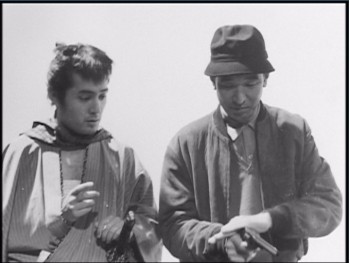 Feature Commentary with Stephen Prince:
Feature Commentary with Stephen Prince:
Again appearing on this Blu-ray disc, film historian and Kurosawa expert Stephen Prince lends his insightful point of view on Yojimbo. He offers a nice mix of scene-by-scene analysis and overall cinematic discussion, such as Kurosawa's usage of two cameras at similar but slightly different lines of sight and the diagonal composition of the village's dusty street, while also staying mildly amusing as he discusses musical cues reminiscent of "Mickey Mouse" sound effects and the longing gazes of the buck-toothed samurai at Sanjuro. It takes a little time to get conditioned to Prince's sober chronicling of sequences, but once you have the material's an extremely good listen.
Akira Kurosawa: It is Wonderful to Create (44:37, HD AVC):
Long-time collaborators and relatives of his actors gather for this Toho Masterworks piece on the director, a segment of a larger series. The focus falls on Yojimbo specifically, giving us anecdotes about the shoot and specific commentary that remains insightful for the duration of this piece. Though the content's exquisite to listen to, it's the huge slew of production photos on-set that are attached to this feature that really captivate. Note that though it's in high-definition, the source of the content doesn't lend itself to HD crispness; essentially, it's only encoded as an AVC file so that it can be accessed via the BD-Java menu during the film itself -- and vice versa.
Also available are a vintage Theatrical Trailer (2:38, HD AVC) and Teaser (1:24, HD AVC) that will really emphasize the beauty of the actual film print, and a small Stills Gallery.
Final Thoughts:
Though Kurosawa's created many dramatically potent and entrancing visual masterworks, Yojimbo could quite possibly be the director's most enjoyable picture to watch. It invokes the essence of classic Westerns in the vein of John Ford for its demeanor, crafting a dynamic within Sanjuro's scheming along the dusty streets of the village that's both chuckle-worthy with its dark comedy and gripping with its situational intricacy. Watching the dominoes fall around the ronin, and witnessing his play with the demand for a near-invincible samurai in a gang-infested town, holds our attention all the way to its surprising and violent conclusion. It remains just as transfixing as the first time I saw it, both for its stellar content and for the spirit of the Western genre that it ensnares -- and, later on, invokes with Sergio Leone's remake. The Criterion Collection offer up their third attempt at Yojimbo in a stellar Blu-ray release, besting the previous DVD in leaps and bounds -- both with its visual and audio treatment -- and retaining all of the special features adorning the previous release. Very, very Highly Recommended.
Note: Screenshots in this review are from the 2007 remastered DVD, and do not represent the quality of the Blu-ray disc.
Thomas Spurlin, Staff Reviewer -- DVDTalk Reviews | Personal Blog/Site
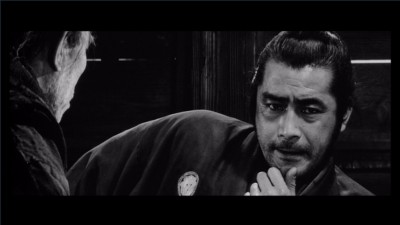 |
That sword for hire is Sanjuro, played by Kurosawa regular Toshirô Mifune, who's a gruff and sturdily-built ronin that recently tread into an emaciated town in the middle of a civil war. Two rivaling criminal outfits, one being a reluctant yet conniving group that focuses on silk and a brothel and another being a wilder ragtag group that focuses on sake, are slowly chopping down each other's brothers in a fit of chaos throwing the town's neutral parties in a panic. Sanjuro, after given early advice that the fighting gangs might require his "services" as a bodyguard, keeps his cool and watches the activity bustle around from a seat in a semi open-aired sake house. One person says he should leave town completely, while another tells him to chop the arm off one of the rival gang members; the samurai, however, waits for the right moment before he does anything, then orchestrates a boom that both ups his value and the body count.
Kurosawa begins to play with a macabre spin on supply and demand as Sanjuro's time in the town extends, creating a clever back-and-forth between the gangs' leaders where the samurai maneuvers around them so that his potential salary swells. What's smart about Kurosawa's direction -- and writing -- is the way that a stream of bleak humor builds around the gang's desire to purchase Sanjuro's services not to be victorious, but more scrambling to save their own hides from meeting his sword. Typically animated and well-drawn caricatures are built in the two groups' midst, including a bloated but dangerous buck-toothed samurai and a tall, menacing henchman to a far shorter boss. Seeing them scramble and sweat under Sanjuro's thumb can be supremely humorous -- especially when he boils tempers to a point where all-out war between shaky-sworded henchmen looks like it's going to break out at "high noon".
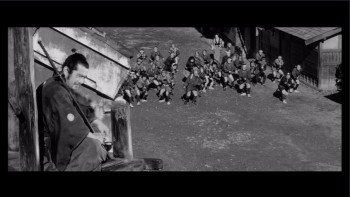 | 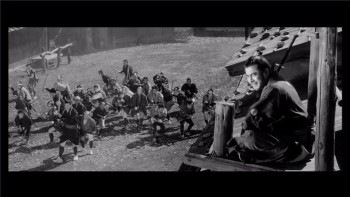 |
Yojimbo's desolate environment is captured through the eye of cinematographer Kazuo Miyagawa, who also shot other Kurosawa films and Kenji Mizoguchi's breathtaking ghost story, Ugetsu Monogatari. Rays of his familiar talent can be seen through soggy rain-drenched sequences in the village, reflecting on the persistent rain in Rashômon, while the dense, linear scenic shots and cool close-ups within Sanjuro's little base of operations in the sake house reflect a similarity to Mizoguchi's film. Since his film relies heavily on the dialogue creating a brash yet humorous atmosphere, Kurosawa allows for the visuals to speak for themselves in capturing the emptiness and desperation within the town. It makes for a visually breathtaking picture as Sanjuro trumps through the hazy streets, taking us by businesses and homes deteriorated by the warfare -- aside from the coffin maker, whose work spikes during the gangs' quarrel.
It's hard to find a Toshirô Mifune performance in a Kurosawa samurai film where he's not a wild-eyed lunatic, but that's just the case with Yojimbo. He's in his element when insanity's taking over, from his iconic turns in The Seven Samurai and Rashômon to a personal favorite performance as the mentally-collapsing Washizu in Throne of Blood. As Sanjuro, however, he's given a starkly different direction; he isn't wild, but he is unabashed in his tactics. Mifune carries him with a methodical, deep gaze, lumbering his slightly twitchy self between clan houses with purpose. It's his signature grin that gives away a bit of that sly madness present in his other performances, seen as he stands atop a watchtower during the gang's stilted brawl near the end of the first act. As he minces words and reticently slithers around each leader with a scowl and a bloodthirsty glint in his eyes, our enthrallment mixes with a desire to grin at his scheming -- and in the scant, aptly-handled sequences where he actually draws his blade. Along with that, some of Mifune's strongest dramatic sequences are with legendary character actor Takashi Shimura, who plays the sake house head Tokuemon and Sanjuro's confidant (and our ears) for his scheming.
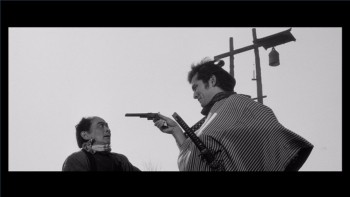 | 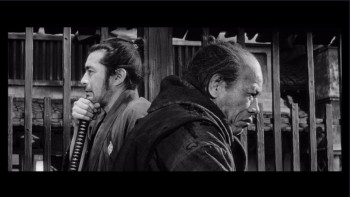 |
Another of Kurosawa's regular actors, Tatsuya Nakadai, eventually arrives into the dusty village as Unosuke, son to one of the crime bosses and a pivotal -- and thought-provoking -- addition to Yojimbo. He looks to be a composed individual who might threaten Sanjuro in the arena of swordplay, up until the point where he draws a revolver. With the revelation of the firearm, the dynamic between the warring gangs completely changes, creating an environment where the otherwise invincible Sanjuro can be killed from a distance. Kurosawa never explicitly addresses the potency of the firearm's presence in the dialogue; instead, he utilizes his characters' mannerisms and the dramatic dominoes collapsing around Sanjuro to emphasize the gun's importance. Along with the gun's cunning presence giving us a plot revelation, a sense of fear and respect for its destructive power becomes a central, bleak element, recognizing it as a great equalizer while Unosuke presents it as a tool of eminence that's barely bridled within his grasp.
What's great about Yojimbo is the way Kurosawa brings together these elements, from visual mood and a defining performance from Mifune to the thought behind violence-based mercantilism and game-changing weaponry, into a picture that by and large exists as a form of barefaced, vivid entertainment. It doesn't exist with much message lying underneath the chaos ensuing around Sanjuro, but more to keep a sadistic grin on our faces as we watch the stern for-hire ronin pit the lower minds of the gangs against one another. With this role, Kurosawa also indirectly established the concept of a "man with no name", a role later adapted by Sergio Leone for his Clint Eastwood collaboration, A Fistful of Dollars. It's interesting that a film created as a violent, samurai-infused love letter to the classic western would, in turn, spark another famous next-generation series of westerns. That's just how finely-tuned and compelling the framework of Sanjuro's character can be, a perfect fit under Kurosawa's direction.
The Blu-ray:
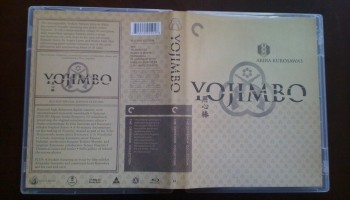 | 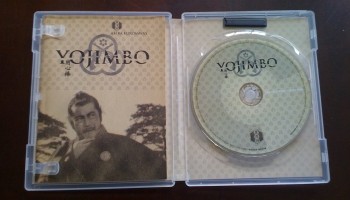 |
The Criterion Collection bring us Yojimbo on Blu-ray, available as both a single release and as a double-feature again with Sanjuro, in their standard clear-case presentation that mirrors both the design and content of the previously-released 2007 remastered edition. The crossed pistols damask pattern adorns the inside of the artwork, while the Booklet again contains the essay "West Meets East" by Alexander Sesonske and comments from Tatsuya Nakadai, cinematographer Kazuo Miyagawa, and script supervisor Teruyo Nogami.
Video and Audio:
Due to the thoroughness of their restoration, The Criterion Collection had to postpone their Blu-ray release of The Seven Samurai -- which resulted in an announcement for Yojimbo and its companion piece, Sanjuro, as high-definition replacements in the time slot. Some might consider that to be a red flag or a cautionary element going into this Blu-ray, since it seems sort of like a secondary decision, but all reservation over its quality will end upon laying your eyes on the first scene after the title cards. Presented in an AVC encode framed at 2.35:1, scanned on a Spirit Datacine from the original film negative elements and not windowboxed this time around, Yojimbo looks absolutely sensational. The Criterion Collection crew, though it's become expected of the label, has delivered another knockout presentation.
This marks their third bout with Kurosawa's film, starting with the original non-anamorphic DVD and leading up to the double-feature remasters released in '07. Seeing how much this film has escalated in quality is quite an impressive comparison, both for the restoration efforts and for the technology in itself. Depth of shadows and the natural film movement can really take one aback, possessing rich black levels and astonishingly fluid motion. Items in the costume design pop, like polka-dots in a robe and pinstripes in another, while textures in wood, against close-ups, and along the dusty ground in the village are finely etched and pleasing to the eyes. The print's also a great deal cleaner, though a few small marks can be spotted, and much of the jittery disposition in the image has been largely contained. Though the most recent DVD is impressive in its own right, this Blu-ray takes the film's visual demeanor to another, far more natural level.
Also receiving a boost, Yojimbo arrives with the option of either an uncompressed LPCM monaural track taken from the 35mm elements or a newly-remastered DTS HD Master Audio 3.0 Perspecta track -- both of which are excellent. The key thing to realize here is that we've got a choice between the two, and either parties will be satisfied with the offerings. The Master Audio option rings with a truer, more balanced nature to dialogue and sound effects, mixed a little bit louder than the monaural track and carrying added breadth to its elements. Pounds from the prayer drums, the pitter-patter of feet across wood surfaces, and the grand wind blowing through the village's streets, though sounding great in both, echo with extra lower-frequency essence with the Master Audio track. It also adds a boost to Masaru Satô's rhythmic "voodoo"-inspired scoring, which hits a mid-range balance that's extrmeely pleasing. Subtitles are available in crisp while English text, which appear within the actual film negative right at the bottom.
Special Features:
If there's anything slightly disappointing about this disc, it's the fact that no additional supplements have been tacked on to the slate of features available on the 2007 DVD presentation of Yojimbo. Still, what's available is still very satisfying, even if they're short in overall numbers.
 Feature Commentary with Stephen Prince:
Feature Commentary with Stephen Prince: Again appearing on this Blu-ray disc, film historian and Kurosawa expert Stephen Prince lends his insightful point of view on Yojimbo. He offers a nice mix of scene-by-scene analysis and overall cinematic discussion, such as Kurosawa's usage of two cameras at similar but slightly different lines of sight and the diagonal composition of the village's dusty street, while also staying mildly amusing as he discusses musical cues reminiscent of "Mickey Mouse" sound effects and the longing gazes of the buck-toothed samurai at Sanjuro. It takes a little time to get conditioned to Prince's sober chronicling of sequences, but once you have the material's an extremely good listen.
Akira Kurosawa: It is Wonderful to Create (44:37, HD AVC):
Long-time collaborators and relatives of his actors gather for this Toho Masterworks piece on the director, a segment of a larger series. The focus falls on Yojimbo specifically, giving us anecdotes about the shoot and specific commentary that remains insightful for the duration of this piece. Though the content's exquisite to listen to, it's the huge slew of production photos on-set that are attached to this feature that really captivate. Note that though it's in high-definition, the source of the content doesn't lend itself to HD crispness; essentially, it's only encoded as an AVC file so that it can be accessed via the BD-Java menu during the film itself -- and vice versa.
Also available are a vintage Theatrical Trailer (2:38, HD AVC) and Teaser (1:24, HD AVC) that will really emphasize the beauty of the actual film print, and a small Stills Gallery.
Final Thoughts:
Though Kurosawa's created many dramatically potent and entrancing visual masterworks, Yojimbo could quite possibly be the director's most enjoyable picture to watch. It invokes the essence of classic Westerns in the vein of John Ford for its demeanor, crafting a dynamic within Sanjuro's scheming along the dusty streets of the village that's both chuckle-worthy with its dark comedy and gripping with its situational intricacy. Watching the dominoes fall around the ronin, and witnessing his play with the demand for a near-invincible samurai in a gang-infested town, holds our attention all the way to its surprising and violent conclusion. It remains just as transfixing as the first time I saw it, both for its stellar content and for the spirit of the Western genre that it ensnares -- and, later on, invokes with Sergio Leone's remake. The Criterion Collection offer up their third attempt at Yojimbo in a stellar Blu-ray release, besting the previous DVD in leaps and bounds -- both with its visual and audio treatment -- and retaining all of the special features adorning the previous release. Very, very Highly Recommended.
|
| Popular Reviews |
| Sponsored Links |
|
|
| Sponsored Links |
|
|
| Release List | Reviews | Shop | Newsletter | Forum | DVD Giveaways | Blu-Ray | Advertise |
|
Copyright 2024 DVDTalk.com All Rights Reserved. Legal Info, Privacy Policy, Terms of Use,
Manage Preferences,
Your Privacy Choices | |||||||












